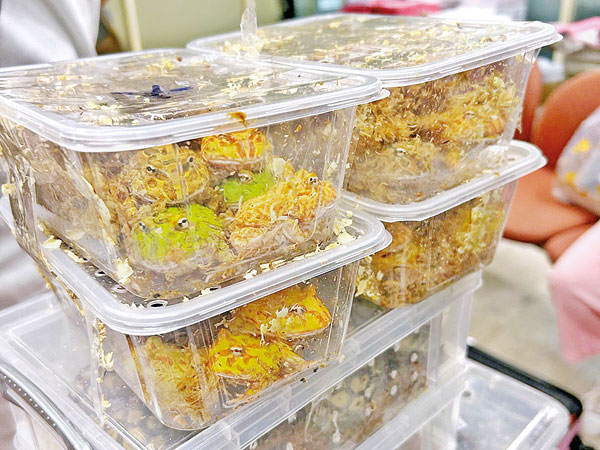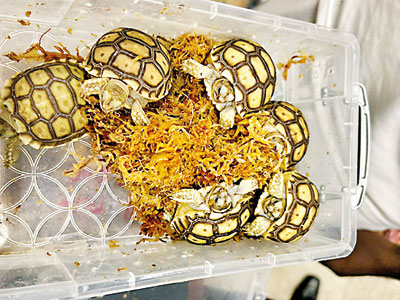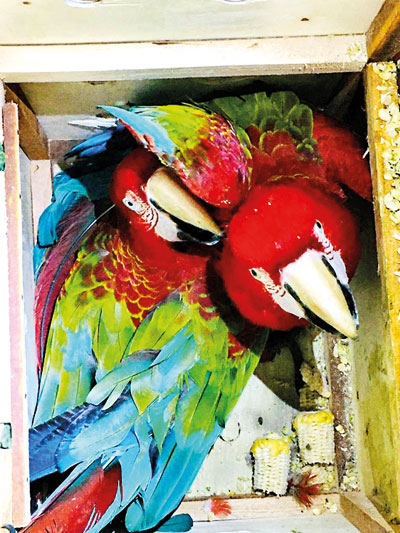News
India’s demand for exotic animals feeds Sri Lanka smuggling activity
View(s):By Kasun Warakapitiya
Sri Lanka Customs and Wildlife authorities have warned that Sri Lanka is becoming a transit point for wildlife and exotic animals.
India has become a hub for exotic animal sales, and more detections are being made at Indian airports, officials said.
Smugglers have devised ways to use Sri Lanka as a transit point for smuggling to cater to India’s demand, they said.
A senior official at Customs who did not want to be named said he suspects that the exotic animals that reach Sri Lanka could be sent via the sea route from the areas between Kalpitiya and Mannar or even exported via legal channels by claiming the exotic animal or birds were bred in Sri Lanka. There were also instances where animals were smuggled out in luggage.

88 exotic animals belonging to over 18 species were detected at the BIA recently
Kalpitiya police said the Thalawila police post had received a complaint on January 7, that there were five wooden boxes holding macaws on the beach of Erabu Kudella. But they only found three boxes, which were then produced before the Puttlam Magistrate’s Courts.
The police are investigating whether the birds were smuggled in from India or if there was an attempt to smuggle via India.
The most recent find was last month at the Bandaranaike International Airport (BIA), where 88 exotic animals belonging to over 18 species were detected.
Customs said the animals were in checked-in luggage in small plastic boxes that had leafy (mossy) bedding, wire bags, and wet paper towels. There were fish and salamanders in plastic bags. 
The animals included two hamsters, two sugar gliders, five giant squirrels, salamanders, four frog species, two clown knife fish, an Indian roof turtle, two Indian spotted river turtles, a black-breasted leaf turtle, two snapping turtles, a fly river turtle, an albino red turtle, twelve sulcata tortoises (African spurred tortoises), unidentified turtle species, four iguanas, two bearded dragons, eight hedgehogs, and three lizards. Apart from that, a bag of mealworms, too, had been detected.
The suspect couple are residents of Avissawella, Puwakpiti ya, and are 35 years old. They had arrived at BIA via Sri Lankan Airlines flight UL 405.
The animals and the suspects were produced before Negombo Magistrate’s Courts. The court had ordered the National Zoological Gardens at Dehiwala to take care of the animals and the Department of Wildlife Conservation (DWC) to investigate. The Customs, too, are investigating.
National Zoological Gardens Director General, Ranjan Marasinghe, confirmed that the illegally imported animals that were detected by the Customs Biodiversity Unit are being quarantined at Dehiwala Zoo. “A few animals died, and the rest are in good health,’’ he said.
The DG said the animals are evidence in the case.
The Zoo DG expressed the dire need for a separate quarantine section maybe in a separate area or within the zoo’s farm.
Meanwhile, zoo sources revealed that some salamanders and several other animals perished before they reached the zoo. According to them, the animals showed signs of dehydration and injuries. 
They said the zoo had received the animals two weeks ago, and efforts are underway to identify the animals.
DWC Director General Chandana Sooriyabandara, declined to give details considering the court proceedings.
He said the DWC, Sri Lanka Customs, Police, Crime Investigation Division (CID), and Interpol have created a Sri Lanka Wildlife Enforcement network to combat illegal smuggling.
Customs media spokesman, Seevali Arukgoda, said international research had not been undertaken on whether Sri Lanka has become a hub for the illegal wildlife and exotic animal trade. “Our main target is to make revenue and help the economy of the country. There is much research to be done. We are planning to conduct research with the intake of new officials, probably next year.’’
However, the Customs Biodiversity Unit founder and former head, Samantha Gunasekara said in spite of there being a policy planning and research unit it is not being utilised for such research.
“How will the Sri Lanka Customs know the prevailing situation of illegal smuggling and learn the position where we are at without research? Failing to carry out research is a major lapse by Customs,’’ he said.
He said he had asked to conduct some research through the unit but the request was denied.
Mr. Gunasekara said the smuggled animals should not be held at Dehiwala, as non-quarantined smuggled animals could pass on pathogens to the zoo’s animals. Instead, he suggested holding them at the 20-plus-acre farm at Gonapala.
Additional reporting: Padma Kumari Kankanamge
The best way to say that you found the home of your dreams is by finding it on Hitad.lk. We have listings for apartments for sale or rent in Sri Lanka, no matter what locale you're looking for! Whether you live in Colombo, Galle, Kandy, Matara, Jaffna and more - we've got them all!

